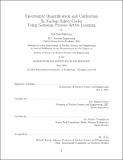Uncertainty quantification and calibration in nuclear safety codes using Gaussian process active learning
Author(s)
Fugleberg, Eric N. (Eric Nels)
DownloadFull printable version (7.241Mb)
Other Contributors
Massachusetts Institute of Technology. Department of Nuclear Science and Engineering.
Advisor
Michael Golay and Robert Youngblood.
Terms of use
Metadata
Show full item recordAbstract
Inverse problems and inverse uncertainty quantification (UQ) are challenging issues when dealing with complex and highly non-linear functions. Methods have been developed to decrease the computational burden by using the Gaussian Process (GP) emulator model framework to approximate the input-output relation of a deterministic computer code. The GP emulator can then be used in place of the computer code to perform Bayesian calibration techniques to determine uncertain parameter distribution. The performance of a GP emulator is largely dependent on the quality of the points in its training set; the best emulator exactly replicates the output of the computer code. The uncertain parameter posterior sample space is not known a priori, resulting in GP training sets covering as much of the prior sample space as possible in hopes of covering the posterior space well enough. This work improves the performance of the simple GP emulator using an active learning methodology to select additional training points which cover the posterior sample space of the unknown parameters. Furthermore, the effect of the covariance function on the performance of the GP is investigated with recommendations made for future GP emulator applications.
Description
Thesis: S.M., Massachusetts Institute of Technology, Department of Nuclear Science and Engineering, 2016. This electronic version was submitted by the student author. The certified thesis is available in the Institute Archives and Special Collections. Cataloged from student-submitted PDF version of thesis. Includes bibliographical references (pages 85-87).
Date issued
2016Department
Massachusetts Institute of Technology. Department of Nuclear Science and EngineeringPublisher
Massachusetts Institute of Technology
Keywords
Nuclear Science and Engineering.